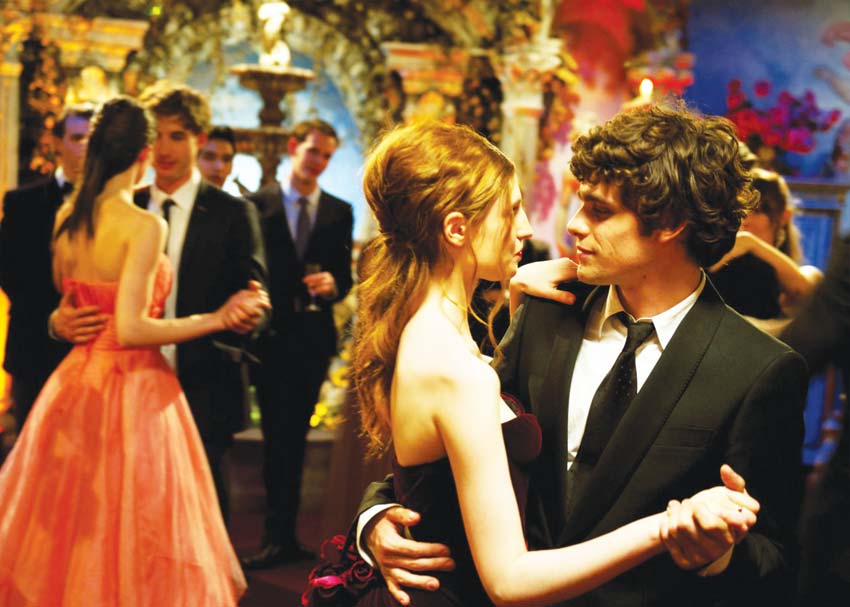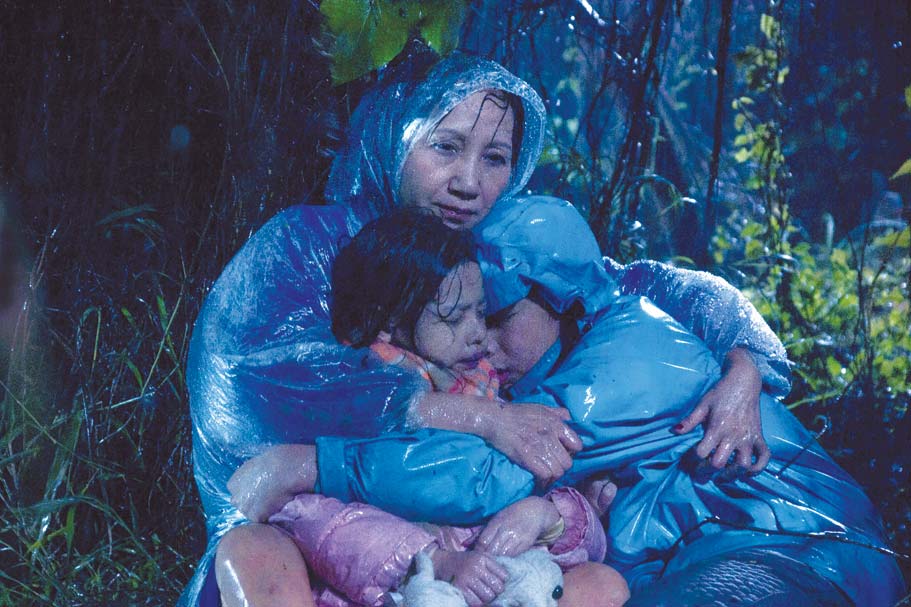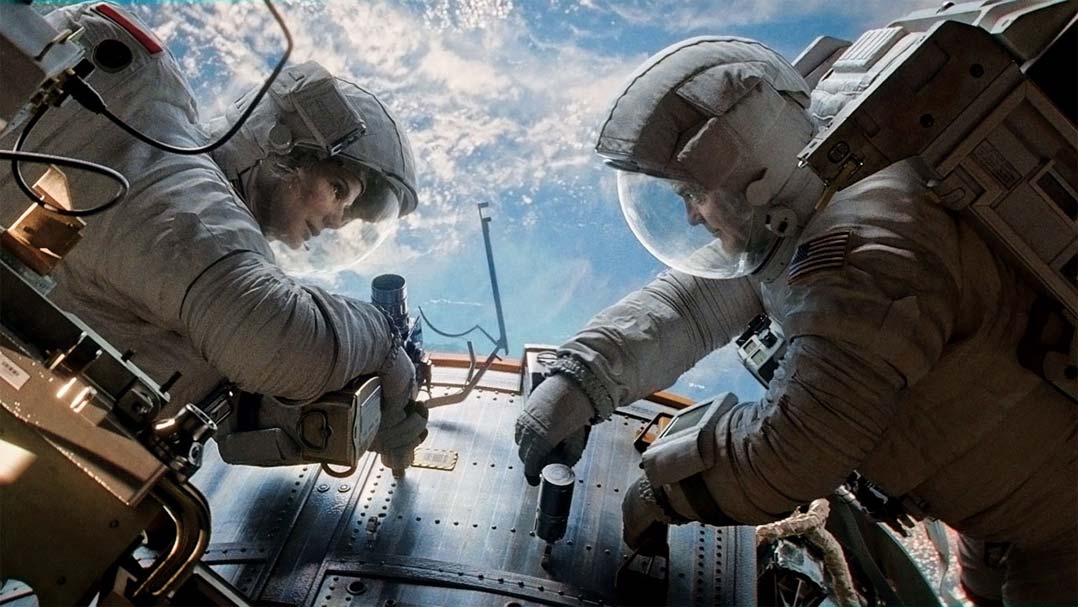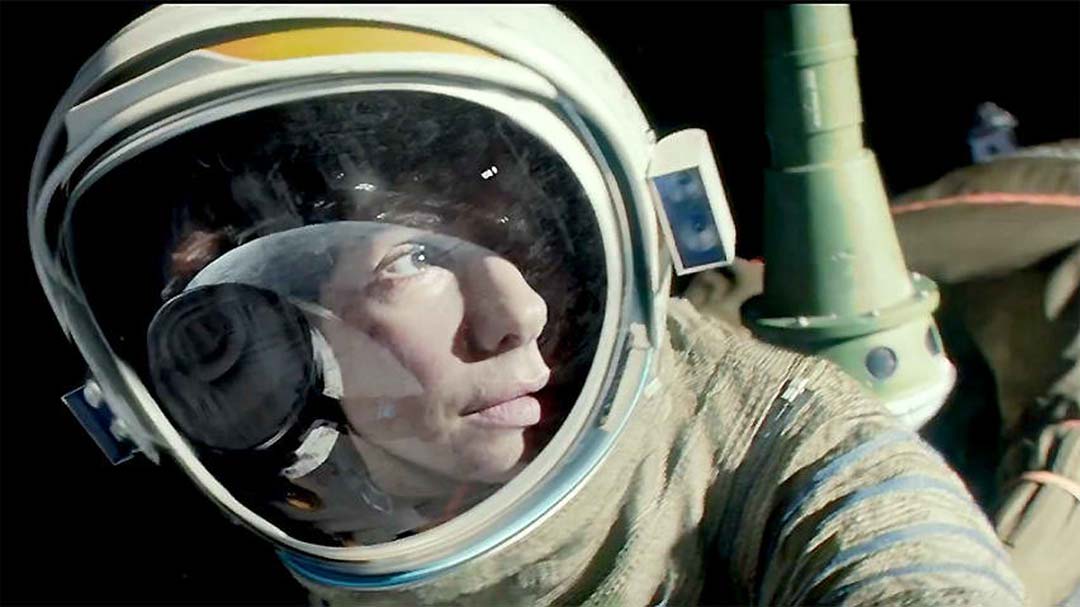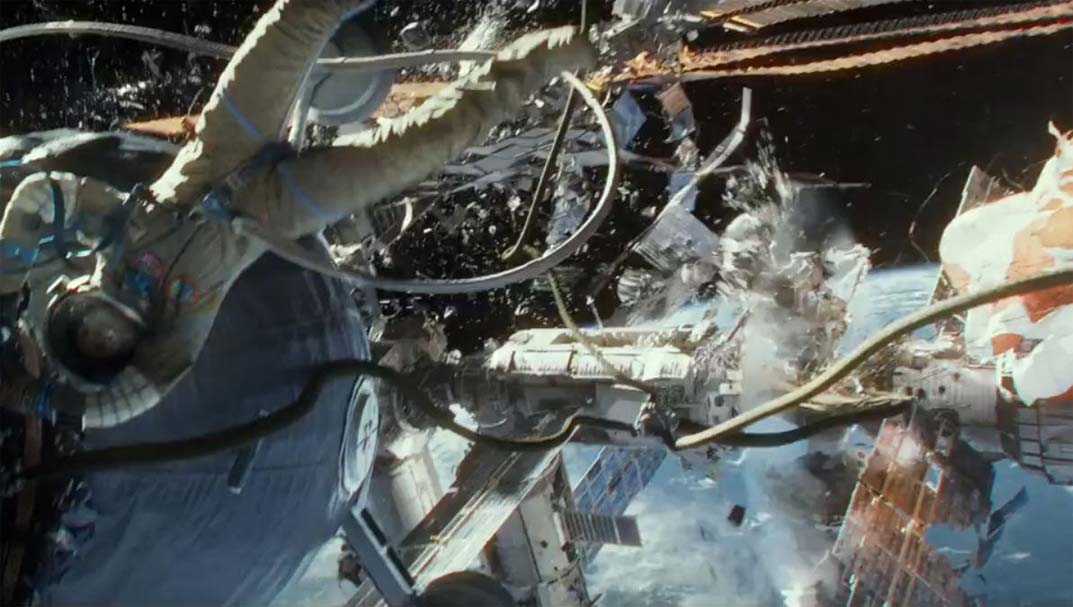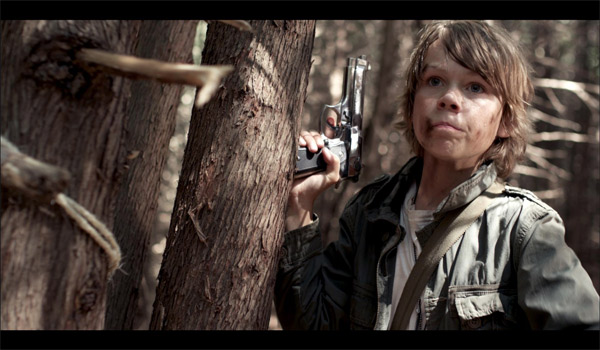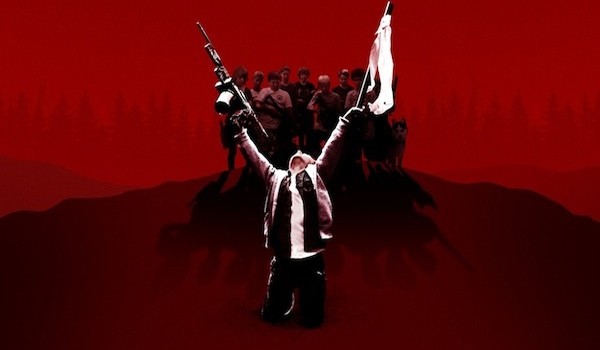[CIFF Capsule Review] Tanta Agua
[Ruby Hornet will be attending the 49th Chicago International Film Festival from 10/10 - 10/24. Be sure to follow along as we bring you coverage from the longest-running competitive international film festival in the country. You can find all of our coverage from this year's CIFF here.]
Tanta Agua
Directors: Ana Guevara Pose and Leticia Jorge
Countries: Mexico, Netherlands, Uruguay
CIFF Screening: October 13, 2013 (6:00pm)
http://youtu.be/DSFwtbBy5yI
Tanta Agua tells the story of a divorced father, Alberto, taking his young son, Federico, and daughter, Lucia, out on vacation in Uruguay. However, his plans for a fun getaway are thwarted when harsh rainstorms take over the town. His optimism slowly begins to fade as his children are uncaring of his attempts to connect with them. While Alberto attempts to salvage an otherwise ruined trip, Lucia discovers her first taste of adolescent pain when a boy she develops a crush on has eyes for another girl.
Tanta Agua takes the formula of a broken family vacation and spins it with a South American flavor of a bittersweet, coming-of-age dramedy. Lucia's heartache over her crush is compared to Alberto's heartache over his inability to connect with his children. Yet, the film is never emotionally-draining or preachy with its themes. Rather, directors Ana Guevara Pose and Leticia Jorge crafted a film that banks on the subtlety of its themes as the pitter patter of raindrops against the family's vacation house roof.
Score: ![]()
![]()
![]()
![]()
![]()
![]() 6 out of 10
6 out of 10
[CIFF Capsule Review] Raze
[Ruby Hornet will be attending the 49th Chicago International Film Festival from 10/10 - 10/24. Be sure to follow along as we bring you coverage from the longest-running competitive international film festival in the country. You can find all of our coverage from this year's CIFF here.]
Raze
Director: Josh C. Waller
Country: United States
CIFF Screening: October 12, 2013 (10:15pm)
[youtube id="6vAs4ZkGGSE" mode="normal" align="center"]
Raze is kind of like the female version of Fight Club minus that film's expository themes of schizophrenia and anti-consumerism. Instead, it attempts to justify rounding up a dozen or so girls together in fights to the death with a cult/secret society obsessed with Greek mythology about strong women.. If the women don't fight in these gladiator-style 1-on-1 fights or lose, their loved ones are killed by secret assassins... or something. Zoe Bell (Death Proof), Quentin Tarantino's go-to girl for female body doubles, stars as Sabrina, a hardened, wiser "older" woman who is captured by the aforementioned cult and must fight for her own survival. If the plot sounds ridiculously shallow, that's because it is. The film's menagerie of characters run the gamut of stereotypical characters, such as the sheepish, shy girl, the girl with the hidden talents, the bloodthirsty girl who embraces the challenge, etc.
However, pulpy, B-movies like Raze never worry too much about plot. Instead, the focus is on how gruesome and entertaining the action can be. Often is the case with films of this nature, the fight scenes are a lot of fun. With Bell's background as a stuntwoman, she's given the spotlight to show off her fighting chops in fights that are similar to MMA matches with a mix of hand-to-hand combat and wrestling techniques. Raze isn't for the faint at heart, though. Since fights are to the death, you'll see women with their faces caved in after a dozen point-blank punches or blood stains against the secluded arena's brick walls.
If you can weather character stereotypes and pointless plots in exchange for brutal, one-on-one female fight scenes, Raze might just be the film for you. It left me wanting more, plot-wise, but once I contextualized the medium of pulp, B-movies, I was able to excuse the otherwise lack of depth. Buy some popcorn, a large Icee, and enjoy the ride.
Score: ![]()
![]()
![]()
![]()
![]()
![]() 6 out of 10
6 out of 10
[CIFF Capsule Review] Under the Rainbow
[Ruby Hornet will be attending the 49th Chicago International Film Festival from 10/10 - 10/24. Be sure to follow along as we bring you coverage from the longest-running competitive international film festival in the country. You can find all of our coverage from this year's CIFF here.]
Under the Rainbow (Au bout du conte)
Director: Agnès Jaoui
Country: France
CIFF Screenings: October 15, 2013 (5:00pm), October 21, 2013 (3:30pm)
http://youtu.be/LFuL0jQ-GMQ
Under the Rainbow mixes fantasy-like fairy tales into a modern day love story. Unfortunately, once the allure of deciphering fairy tale tropes (enchanted godmothers, wolves in sheep's clothing, evil stepparents, etc.), the main plot begins to feel thin predictable, and boring.
Laura is a young woman looking for her Prince Charming, her knight in shining armor. When she finds Sandro at a party, cheesily under an angel statue pointing directly at him, it's love at first sight for the two. As their romance begins to blossom, Laura is tempted away from the aspiring musician by Maxime, a well-known musician in his own right. As Maxime both steals Laura away and helps Sandro's career, Laura's aunt, Marianne, and Sandro's father, Pierre, establish a subplot of their own as Marianne attempts to become more independent of her ex-husband's influence while Pierre faces the prospect of his death in a few days (prophesied by a psychic 20 years prior).
I'll admit, the film's clever use of the fairy tale tropes added an interesting gimmick to the film. However, that's all it is: a gimmick. Once the shine begins to fade away, and the warm romance between Sandro and Laura begins to crumble, Under the Rainbow becomes a melancholic romantic comedy/drama. I loved how every primary character had some sort of connection or plot line intersect with another's, yet the culmination of the film felt empty.
Score: ![]()
![]()
![]()
![]()
![]() 5 out of 10
5 out of 10
[CIFF Capsule Review] Blue is the Warmest Color
[Ruby Hornet will be attending the 49th Chicago International Film Festival from 10/10 - 10/24. Be sure to follow along as we bring you coverage from the longest-running competitive international film festival in the country. You can find all of our coverage from this year's CIFF here.]
Blue is the Warmest Color (La vie d'Adèle chapitres 1 & 2)
Director: Abdellatif Kechiche
Country: France
CIFF Screening: October 12, 2013 (6:30pm)
Release Date: October 25th, 2013 (limited)
[youtube id="7PcgYoBUtlo"]
A lot has been said about Blue is the Warmest Color, and more will continue to be said as more people watch the film primarily known for its lesbian sex scenes. However, the sex scenes, explicit as they are, run the risk of overshadowing such a beautiful film about first love and identity/self-discovery. It's a French film through and through in the way the film has an air of warmth and passion that films from other countries can't necessarily pull off in the same way.
Unfortunately, what makes Blue is the Warmest Color so great is sometimes taken away from the aforementioned sex scenes between stars Adele Exarchopoulos and Lea Seydoux. My problem with sex scenes in any form of media/entertainment is how necessary they are. Do they build upon the film's narrative? Do they actually bring more to a character's arc/personality? Are they shot in good taste? Simply put, the sex scenes in Blue is the Warmest Color are so artificial that the passion they're intended to invoke are laughed away as male voyeurism.You can tell why controversy came up over the actresses' discomfort with the sex scenes and director Abdellatif Kechice's obsession over them. Out of the handful of sex scenes in the film, only maybe two or three of them are actually justified. These scenes were supposed to represent the fulfillment of young love, comfortability in one's self and in another person, and the physical embodiment of love. Instead, they're pornographic and uncomfortable for both audience and actress.
I really hope the sex scenes don't overshadow the otherwise remarkable, amazing film framing them in the minds of general film audiences. Blue is the Warmest Color is lighthearted and contemplative, enlightening and heartbreaking, entertaining and frustrating; the very definition of French film pondering of Self. Overall, Blue is the Warmest Color has been my favorite film of CIFF thus far. There's a reason why it won the Palm d'Or at Cannes; it's just a matter of general audiences' ability to see the film for what it truly is: a magnificent love story that will hopefully be remembered for its remarkable performances from Seydoux and Exarchopoulos and not the handful of sex scenes.
Score: ![]()
![]()
![]()
![]()
![]()
![]()
![]()
![]() 8 out of 10
8 out of 10
[CIFF Capsule Review] Stray Dogs
[Ruby Hornet will be attending the 49th Chicago International Film Festival from 10/10 - 10/24. Be sure to follow along as we bring you coverage from the longest-running competitive international film festival in the country. You can find all of our coverage from this year's CIFF here.]
Stray Dogs (Jiao You)
Director: Tsai Ming-Liang
Country: Taiwan
CIFF Screenings: October 11, 2013 (8:30pm), October 13, 2013 (12:30pm)
[youtube id="_xsQfTkvBwg"]
I wasn't familiar with Tsai Ming-Liang's previous works, but the allure of a film described as "one of his most emotionally powerful films" reeled me in. Unfortunately, the power of these emotions is lost amidst the overuse of long shots and lack of a narrative. Stray Dogs is about a father who makes his living as a human billboard while his two children skip school and make do with what they can to kill time during the day. The family has fallen into this routine of doing nothing, then squatting in abandoned apartments at night. However, Stray Dogs doesn't worry itself or the audience about what it's about. Rather, the focus of the film is on what's seen.
Stray Dogs is mostly made up of long shots consisting of the slightest bits of movement to ensure audiences that the film hasn't become frozen or paused. The camera lingers on as main actor, Lee Kang-sheng, eats his food or smokes a cigarette. There are scenes of actual movement and motion, but the bulk of Stray Dogs prefers to let the audience play voyeur as they examine the family. Much has been said about the film's penultimate scene, a 14-minute long shot where Lee Kang-sheng stands behind a woman as they look off-screen. The gravitas of the scene is displayed on the actors' facial expressions with the occasional sip of liquor or shed tear contextualizing the scene.
Stray Dogs is poetic in its oftentimes silent scenes, yet boring and plodding because of them. On a technical side, it's visually-arresting with every long shot composed and framed to near-perfection. Overall, however, you'll find yourself feeling arrested with nowhere to go because of its two-hour duration with no escape in sight. Even the most ardent fans of avant-garde, art-house films might find Stray Dogs too empty.
[RH Review] Gravity
3D in film is a gimmick. Who cares if a popcorn or booger looks like it's hurtling towards you? Because of its unnecessary nature, I've spent years actively hating and avoiding watching films in 3D. As I walked towards the theater for my screening of Gravity a few weeks ago, I was dismayed when I realized it would be shown in 3D. I let out an audible groan, I alerted my friend of the unfortunate circumstance facing us, and I gritted my teeth as the film began.
In that moment, I was sure that my protestations against 3D would be justified, enhanced even. As the credits rolled, however, I realized something: As Hollywood slowly realizes how unnecessary a gimmick 3D is and begins to move away from the fad, Gravity stands at the top as a prime example showcasing just how powerful and truly innovative the format can be. If you're too lazy to read the rest of my review, know this: Watch Gravity on a 3D IMAX screen, no ifs, ands, or buts.
http://youtu.be/H4coTNta-YA
Gravity
Director: Alfonso Cuaron
Rating: PG-13
Release Date: October 4, 2013
Dr. Ryan Stone (Sandra Bullock) is a biomedical engineer on her first trip to space to fix malfunctioning equipment on a sattelite. Her captain, Matt Kowalski (George Clooney), is an experienced astronaut on his final voyage in space. As he floats aimlessly in space to break a spacewalking record, Stone's inability to adjust to the lack of gravity leaves her nauseous and unable to work effectively. Despite the idyllic nature of space's nothingness, the crew is alerted to debris floating in their direction as the product of a Russian missile destroying space stations. Suddenly, Stone and Kowalski find themselves in danger as the shrapnel makes contact with their ship, killing the entire crew and leaving Stone hurtling through space.
As she begins to reflect on her life, Kowalski attempts to keep her calm as he rescues her. However, Stone's oxygen supply is dangerously low, and Kowalski's jet pack begins to lose thrust. When all seems lost, they miraculously make it back to a space station... but the threat is far from over.
At first glance, Gravity might seem limited in conflict; however, once the film begins, you realize that the inherent conflict of being alone in space is what drives the entire film. The entire film takes place within the confines of the first conflict until its resolution - that is to say that there are no flashbacks created as an attempt to contextualize the story or to create a false sense of empathy for Dr. Stone. All of the pertinent background information is shared through passing comments shared in conversations between Stone and Kowalski.
Furthermore, it's refreshing to have a film take place entirely in space with no aliens whatsoever. Instead, the main focus, as it should be, is solely on Dr. Stone and her attempt to return to Earth. By focusing on Bullock with no distractions (background ploys, shallow attempts at creating empathy, etc.) beyond the conflict at hand (i.e. (wo)Man vs. Nature (space)), Gravity is both a psychological thriller and a character study that exemplifies just how frightening it can be to be lost in space... as if we needed a film to understand the fear.
Alfonso Cuaron's known for his direction and focus on exceptional cinematography, and it shows in spades in Gravity. Despite the film being shot almost exclusively on a green screen, the camerawork in this film is spectacular. Regular Cuaron collaborator Emmanuel Lubezki's (Children of Men, The Tree of Life) camerawork plays just as much of an important role in the film as Bullock does. After all, this is the man who won a BAFTA for Cinematography in Children of Men. Don't let the heavy use of CGI fool you: Gravity is breathtaking in its cinematography.
This is supported by the aforementioned exceptional use of 3D. Given the nature of space where the basic concept of direction is essentially deemed useless, there's no telling which way is up. With every rotation of a satellite, every roll Dr. Stone takes in her free fall, every piece of scattered debris is exacerbated and accentuated by the extra depth that 3D allows. Never before have I contemplated what an extra dimension could do for a film.
What's used and exploited as a gimmick and cash cow by lesser directors has been used to actually bring purposeful depth to Gravity, both figuratively and literally. The entirety of space simply would not have been the same had I seen Gravity on a normal screen. You'll want to shell out the extra $10 for 3D, possibly even more on an IMAX screen, because every inch, every centimeter, every pixel of the screen plays an important role in this film. Who would have known that mise en scene would be so important for a film where complete emptiness takes up the majority of the screen?
Gravity is literally breathtaking. As Dr. Stone desperately gasped for air as her oxygen tank quickly emptied out, I, too, took deep breaths alongside her. Was it because I truly felt for her? Was it because the 3D made me feel as if she were right in front of me, just out of arm's reach? Was it because of the theater's sound system emphasizing every small sound effect? Perhaps all of this played a role, yet it's because of everything I've mentioned up to this point that I urge every single one of you to watch Gravity. Films like this are the reasons why theaters exist, why Hollywood is the titan of industry that it is, why people like me spend hours of our lives writing and analyzing every second of every film we have ever seen and will ever see.
I truly believe 3D films will fade away by the end of 2014. If so, let Gravity be the medium's crowning achievement. If, for some reason, 3D overstays its welcome (as if it hasn't already), let Gravity be the film that demonstrated just how powerful and awe-inspiring the format truly can be.
Score: 9 out of 10
[RH Review] Don Jon
Let's all be honest for a moment: Who doesn't like porn? Whenever you need a quick fix or a titilating moment to yourself, porn is available right at your fingertips. However, like all good things, too much of it could prove to be detrimental in the long run. Using porn as a metaphor for society's obsession with looks and surface level interaction, Joseph Gordon-Levitt's written/directorial debut, Don Jon, crafts a film that is sexy, entertaining, and smart enough to raise the bar on what makes a romantic-comedy good.
[youtube id="6615kYTpOSU"]
Don Jon
Director: Joseph Gordon-Levitt
Rating: R
Release Date: September 27, 2013
Gordon-Levitt stars as the titular Jon Martello, a typical Jersey Shore-esque man who is admired and hailed by his friends for his ability to pick up girls with little to no effort. However, despite his surface-level gifts, he yearns for something more... something that can be as fulfilling as the type of sex he sees in the hours of porn he spends watching on a daily basis. Even after he meets "the most beautiful thing [he's] ever seen," the lovely Barbara (Scarlett Johansson), the sex between them still leaves him wanting more. However, when his addiction threatens to ruin their budding relationship, he finds help from the most unlikely of sources: an older woman in one of his classes (Julianne Moore).
On the surface, Don Jon may come off as the typical rom-com where the protagonist finds himself, changes his ways, and lives happily ever after. Does that end up happening? ...sort of. However, this is JGL at the helm of the film. The layers of subtlety sprinkled throughout Don Jon are enough to cater to any cinephile who over-analyzes every film they watch (myself included), while that same thematic depth isn't overbearing for those disinterested in reading the film like a book.
Gordon-Levitt touches on some of these much deeper themes, such as the "stereotypical" portrayal of masculinity and how men feel as if they have to live up to such expectations, as well as a look at unrealistic depictions of sex in porn and how "real" sex is nowhere like the fantasy sex displayed online. However, Gordon-Levitt uses comedy and humor to address these issues. The biggest theme found within Don Jon is society's obsession with looks and the surface level of everything. Take, for example, Jon's relationship with Barbara. On the surface, they are two very attractive people who, because of how they look, ought to work things out with one another for the sake of it. However, as Jon realizes as the film goes on, there's more to a relationship than just how a girl looks or how good the sex is. What results is a smart (probably the smartest) rom-com that isn't heavy-handed.
Sometimes, the move from being in front of the camera to behind the camera can be hard, but with Joseph Gordon-Levitt's many years in the business, the transition was fine-tuned. From the editing to the acting to the script, Don Jon just feels like a labor of love. I hope and pray Gordon-Levitt acts for the rest of his life, but if he ever does decide to permanently move behind the camera, Don Jon is proof that he'll be perfectly fine in the director's seat.
Score: 8 out of 10
[RH Review] I Declare War
There's a lot to be said about the media and its effect on children. From mainstream news coverage to pop culture/entertainment, children will find a way to incorporate and digest what they hear and see into their lives. I did it when I was younger, my friends did it, and I'm sure you reading this have all done it. This isn't a discussion on censorship, but an acknowledgement on the effect media has on children. I Declare War frames an imaginative game of War as a way to comment on the dangers of the aforementioned negative media effects on children, overactive imaginations, and the hyperbolic drama that pubescent boys face at such a pivotal age.



